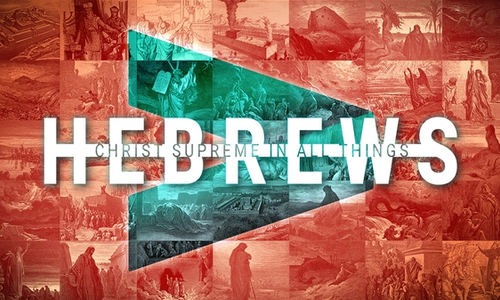Sunday Service 9am & 11am
Wednesday Service 7pm
(210) 920-6502
551 E Nakoma St.
San Antonio, TX 78216
Join a small group to study this sermon with like-minded believers.
Hebrews 2:5-9
LISTEN. STUDY. APPLY.
Video
Audio
Footnotes
Manuscript
We are continuing our series today, “Christ Supreme in All Things.” And I’ll have you notice that this is the first time in the book of Hebrews that the name Jesus is used. Everyone see that in verse 9?
But we see him who for a little while was made lower than the angels, namely Jesus
Up to this point, the author has spoken about Jesus, the second person of the Trinity. But he hasn’t used his name. He’s used the designation “The Son.” So you have those repeated statements in chapter 1 about the Son being better than the angels. The Son is greater. The Son is superior. The Son is even Creator of the Universe. He is God, the Son—the logos of John 1.
But now, in Hebrews 2, the author explicitly uses the name Jesus, and I don’t think it’s a coincidence that this coincides with his comments about the Son’s incarnation. This Son of God came to earth and took on a human name, a really common name in the first century Jewish world. Lots of parents in that day named their sons Jesus or Jeshua. It was an homage to the great hero/deliverer of the OT, Joshua. So it’s not surprising that this is the first occurrence of Jesus in Hebrews, because this is the first explicit reference to the incarnation in this book. The Son of God became Jesus. The Son of God was born into our world. The Son of God became a little lower than the angels. That’s a surprising development in this letter.
The author spent a fair amount of time in the first chapter talking about how much greater the Son is to angels. Now it feels like he is compromising that argument by saying that Jesus became lower than the angels. What? Jesus, is lower than the angels? Why would he say that? Doesn’t that compromise his argument? No. No, it doesn’t. Because part of Jesus’s grand journey from glory to even greater glory involved as cross. He moves from the cross to a crown.
-----------------------------------------------------------------------------------------
The title of today’s message is “From Cross to Crown.” And I’ve got three points for you this morning from Hebrews 2:5-9. Write these down.
1) Jesus will bring the coming world into subjection (2:5)
Look with me at verse 5. The author writes…
5 For it was not to angels that God subjected the world to come, of which we are speaking.
Now, here we are again talking about angels. The author took a short break in 2:1-4 to warn you about drifting from the gospel. Now he returns to angels and says, “Speaking of angels… back to my arguments about that…the world to come will not be subjected to angels.” At this point, I hope, the people who received this letter for the first time would have said, “Okay, Okay, we will stop thinking more highly of angels than we ought to think.” For the author’s part, he is overarguing this point to quash any notion of Jesus being on par with angels or angels being on par with Jesus.
And part of his argumentation here has to do with the world to come. The world to come will be subjected to Jesus and not to angels. That word for “subjected” here is the Greek ὑποτάσσω. It’s a common word in the NT. It’s a word that is translated “be subject to” or “submit.” It’s the word used in Ephesians 5:21-24 and Colossians 3:18 when Paul says “Wives, submit [be subject] to your husbands.” Peter uses that same word to describe the same thing in 1 Peter 3:5. Paul tells children to submit to parents (Eph 6:1-4). He tells slaves to submit to masters (Eph 6:5-9). He tells the church in Rome to submit to the government (Rom 13:5). Peter tells churches to submit to their elders (1 Pet 5:5). James uses this same word when he says, “Submit [ὑποτάσσω] yourselves therefore to God. Resist the devil, and he will flee from you” (4:7).
The reality is that everyone is required to submit to someone. Everyone is subject to someone else. But this verse says that everyone and everything, in fact the whole world will submit, they will be subject to Jesus. Not to angels, but to Jesus. In fact, God will subject, or force the world to submit, to Jesus. Wittingly or unwittingly, all will bow the knee to King Jesus.
And some of you might ask, “Is that a “now thing” or a “later thing,” Pastor Tony? Is that already the case? Or is that a future reality?” Well, it’s both. It’s what theologians call “inaugurated eschatology.” Hebrews 6:5 says that some have “tasted the goodness of the word of God and the powers of the age to come.” Some have already received a foretaste of the glory to come.
This is what’s called “the already/not-yet” of Jesus’s reign over this world. His kingship has been inaugurated, but it still awaits full consummation at his return. To use the language of the OT, Psalm 8 says that all things have been put under his feet. Psalm 110 says “Sit at my right hand, until I make your enemies your footstool.” Jesus has come once, but he will come again. He came the first time to provide redemption for his friends. He’ll come a second time to bring retribution to his enemies. And as part of that, he will bring the whole world into subjection.
This is how Paul says it: “[A]t the name of Jesus every knee should bow, in heaven and on earth and under the earth, and every tongue confess that Jesus Christ is Lord, to the glory of God the Father” (Phil 2:10-11).
-----------------------------------------------------------------------------------------
So Jesus will bring the coming world into subjection. Everyone will ὑποτάσσω to Jesus. That’s his second coming. Now watch how the author of Hebrews bridges Jesus’s first coming with his second coming. Write this down as #2.
2) Jesus became lesser in order to rule greater (2:6-8)
Look at verse 6 with me.
6 It has been testified somewhere,
Now this author is about to quote Psalm 8. But he sets it up in an interesting way. This is part of the reason why many people don’t think that Paul wrote the book of Hebrews. Because this is not the way that Paul quotes the OT. He says, “It has been testified somewhere…”
I don’t think that means that he doesn’t know where it is found. This author is extremely familiar with the OT. I’m sure he knows that he’s quoting David from the book of Psalms. But he says it this way to emphasize the divine authorship of Scripture over against human authorship. And he uses these divinely inspired words from Psalm 8 to talk about the supremacy of Christ.
“What is man, that you are mindful of him, or the son of man, that you care for him? 7 You made him for a little while lower than the angels; you have crowned him with glory and honor, 8 putting everything in subjection under his feet.”
Just for fun, turn with me to Psalm 8, and let’s read the context of this psalm together. I love this psalm. It’s one of my favorites in the Psalter. Philip Hughes calls Psalm 8, “an ode [to] … the insignificance yet at the same time the remarkable dignity of man.”
David starts the psalm by saying,
Psalm 1:1 O LORD, our Lord, how majestic is your name in all the earth!
Now notice the two different names for God in verse 1. “O LORD, our Lord.” Everyone see that? The first LORD is capital L.O.R.D. This is Yahweh. This is the covenant name for the God of the Israelites. We know Yahweh as the Trinitarian Deity that chose us, loved us, and bought us with Christ’s blood in this NT era. So we can say, like the OT Israelites, “O LORD, you are our Lord. O Yahweh, you are our Lord.”
The second “Lord” in that phrase is the Hebrew Adon (אָדוֹן). It means “sovereign ruler” or “powerful one.” And there’s a possessive pronoun attached to it. Yahweh is not just the Lord and sovereign ruler in our world. He is our Lord and our sovereign ruler. David is saying that he rules over us! And we are so glad he does.
Notice how that same line is repeated in verse 9 of Psalm 8. Everyone see that? That’s an example of what we call an inclusio. David begins and ends the psalm with the same line about God’s sovereignty. It’s like a “sovereignty sandwich.” And everything between those two slices of bread is framed by those epic statements at the beginning and end.
David says in verse 1 and 2.
You have set your glory above the heavens. 2 Out of the mouth of babies and infants, you have established strength because of your foes, to still the enemy and the avenger.
I think that this is an autobiographical reference to David himself. Because David was the youngest in his family. He was the weakest in his tribe. And he was from the small, insignificant village of Bethlehem. But God used David to silence the giant Goliath, and to embarrass the great king Saul. And God made the weak young David, the strong king David to fight Israel’s foes and “to still the enemy and the avenger.”
3 When I look at your heavens, the work of your fingers,
Not the work of your hands or the work of your arms… but your fingers. God hand-crafted, so to speak, this world and everything in it. This is a description of the delicate craftsmanship that God put into this world when he created all the majesties of heaven in six days …
the moon and the stars, which you have set in place,
Humans didn’t put the stars in place… Scientists didn’t hang the moon in place… we barely even understand the stars in our skies. Charles H. Spurgeon said this more than 100 years ago, “Astronomy shows us what an insignificant being a human being appears amidst the immensity of creation. Though he is an object of the paternal care [God’s care], and the mercy of the Most High, yet he is but a grain of sand to the whole earth, when compared with the myriads of beings that people the amplitudes of creation.” Seven billion people and counting, right?
Spurgeon says also, “What is the whole of this globe [earth] in comparison of the hundred millions of suns and worlds which by the telescope have been [glimpsed]? What are they in comparison with the glories of the sky?” Bruce Waltke in his commentary on Psalms adds, “We wonder what Spurgeon would say today, if he could see through the Hubble Space Telescope, now observing billions of stars—indeed billions of galaxies—to see so enlarged the scope of God’s mercy to humankind.”
Think about the expanse of the universe for just a second. This is good for your soul; go on this journey with me. Think about the billions and billions and billions of galaxies. And our galaxy, the Milky Way, is just one of billions of others. Our planet, the earth, is an infinitesimal speck in the universe. Actually our sun, which dwarfs our planet, is an infinitesimal speck in the universe. And when you pray to God, you are praying to the God who created those planets and stars and galaxies and holds them in place. That’s the God you communicate with when you pray. That is the God you submit to!
Therefore, look at verse 4.
4 what is man that you are mindful of him, and the son of man that you care for him?
Okay, now we come to the part where Psalm 8 intersects with Hebrews 2. And you can see in context here that Psalm 8 is all about how magnificent God is and how small man is. What is “man” in light of all these stars, suns, and galaxies. Why does God even care about man? Man is puny and infinitesimal compared to deity.
And yet, look at verse 5.
5 Yet you have made him a little lower than the heavenly beings and crowned him with glory and honor.
What’s that a reference to? That’s a reference to Genesis 1. David was reading his Bible when he wrote this. David was reading Scripture when he wrote Scripture. And Psalm 8 is a meditation on Genesis 1. Which is fascinating when you think about Hebrews 2. Because Hebrews 2 is a meditation on Scripture too. The author of Hebrews was reading Scripture too, when he wrote Hebrews 2. So Hebrews 2 is a Scripture written about a Scripture (Ps 8) that was written about a Scripture (Gen 1)!
And speaking of Genesis 1. Look at Psalm 8:6-8.
6 You have given him [man] dominion over the works of your hands; you have put all things under his feet, 7 all sheep and oxen, and also the beasts of the field, 8 the birds of the heavens, and the fish of the sea, whatever passes along the paths of the seas.
That’s an allusion to the “dominion passage” of Genesis 1 where God says, “Be fruitful and multiply and fill the earth and subdue it, and have dominion over the fish of the sea and over the birds of the heavens and over every living thing that moves on the earth” (1:28). God created Adam to be the ruler of the world. And God received praise for this. Look at verse 9. Here’s the other slice of bread in that “sovereignty sandwich.”
9 O LORD, our Lord, how majestic is your name in all the earth!
Now stay with me here because this is important. What’s described in that Psalm 8 passage is what theologians call anthropology. This is a description of man. We are a little lower than angels, meaning we don’t have the power and majesty that they do. But we were given dominion over the world. And we are made in God’s image according to Genesis 1. We are God’s special creation. So whenever PETA comes around and says, “A Rat is a Pig is a Dog is a Boy,” you can say, “No PETA. That’s not what God says about us. We are substantively different than animals. We are made in God’s image. We are a little lower than the angels.”
Now something’s changed since Genesis 1. And we need to deal with that. Our world is not what it was in Genesis 1. And that’s because of what took place in Genesis 3. G.K. Chesterton said once, “Whatever is or is not true about men, this one thing is certain—man is not what he was meant to be.” This is also part of anthropology. Man sinned. Man fell. And so now, we are not just made in God’s image, we are also depraved and sin-stained. And this world that we have dominion over is not what it was in the beginning. It’s fallen. So now we have cancer. Now we have plants and animals that eat us. Now we have tornadoes and hurricanes and volcanoes ravaging the planet. Now we have turtles that outlive us. Now we have war and disease and pestilence. Adam has failed. Mankind has failed.
And so what God had to do is he had to reinvent anthropology through the mechanism of christology. He had to bring into our world a new Adam, a second Adam. Paul calls him the “last Adam” (1 Cor 15:44-49). He’s a true and better Adam. And that’s what the author of Hebrews describes in Hebrews 2.
So back to Hebrews 2, verse 6. Now that we have the context for Psalm 8, let’s read this again.
6 It has been testified somewhere [Psalm 8], “What is man, that you are mindful of him, or the son of man, that you care for him?
Man is so small in the grand scheme of things. God is so much greater than mankind. And yet God loves his little creatures. In fact God became one of his creatures in order to save his creatures.
7 You made him for a little while lower than the angels; you have crowned him with glory and honor, 8 putting everything in subjection under his feet.”
Now here’s where anthropology becomes christology. God put everything in subjection to man, but man failed him. Man sinned. And so God had to rescue mankind. And he did that through the God-man, Jesus Christ. And the author of Hebrews is reading this Psalm 8 passage not as if it is harking back to Genesis 1, but as if it is heralding forward to Jesus Christ. Jesus is the one who was made, for a little while, lower than the angels. Jesus is the one who is crowned with glory and honor. Jesus is the one who will have everything— everyone and everything — put in subjection under his feet. There’s that word again, by the way—ὑποτάσσω. That word shows up four times in this passage.
Look at verse 8.
Now in putting everything in subjection [ὑποτάσσω] to him, he left nothing outside his control. At present, we do not yet see everything in subjection to him.
That’s the already/not-yet. Christ is King, but his reign still awaits full consummation. Everything and everyone are under his feet; they just don’t know it yet. That’ll become clear when Jesus returns. Jesus’s first coming wasn’t about retribution, it was about redemption. He came to redeem. He came to save. “He became lesser in order to rule greater.” That way when he returns, He’s going to have an army of saints behind him worshipping and following him. And I’m going to be part of that delegation. We’re all going to be there to see his rule and reign. I just hope you are on the right side of that when he returns.
-----------------------------------------------------------------------------------------
And here’s the payoff for all of this. Here’s where this author has been driving this train. Look at verse 9.
9 But we see him who for a little while was made lower than the angels, namely Jesus,
There it is. There’s the first reference to “Jesus” in this book. Jesus, for a little while was made lower than the angels. Just 33 years or however long Jesus was on this earth. Paul says he voluntarily set aside his divine attributes. Paul says, “though he was in the form of God, [he] did not count equality with God a thing to be grasped, but emptied himself, by taking the form of a servant, being born in the likeness of men. And being found in human form, he humbled himself by becoming obedient to the point of death, even death on a cross” (Phil 2:6-9).
The author of Hebrews says it this way:
9 But we see him who for a little while was made lower than the angels, namely Jesus, crowned with glory and honor because of the suffering of death, so that by the grace of God he might taste death for everyone.
Go ahead and write this down as #3 in your notes:
3) Jesus tasted death so that we might escape it (2:9)
Paul says this in Philippians. Let me quote the passage in full. “[T]hough [Jesus] was in the form of God, did not count equality with God a thing to be grasped, but emptied himself, by taking the form of a servant, being born in the likeness of men. And being found in human form, he humbled himself by becoming obedient to the point of death, even death on a cross. Therefore God has highly exalted him and bestowed on him the name that is above every name, so that at the name of Jesus every knee should bow, in heaven and on earth and under the earth, and every tongue confess that Jesus Christ is Lord, to the glory of God the Father” (Phil 2:6-11).
Jesus went from the cross to the crown. Jesus was crowned with glory and honor because of the suffering of death. I don’t know how to quantify it mathematically. I don’t know how to make sense of it numerically. But Jesus is crowned with even more glory and even more honor because of what he went through at the cross. Jesus is even more glorious as a result of his incarnation and because of his death on our behalf. And one the best evidences of that is us right here. Here we are in San Antonio, Texas, a bunch of heathen Gentiles worshipping and praising Jesus Christ. And Jesus Christ is being metaphorically crowned with glory and honor right here every Sunday. Why? Because he suffered death on our behalf. Because he tasted death for everyone.
What does that mean, “tasted death for everyone”? Well let me explain that. This is what we call substitutionary atonement. He died a death, a certain kind of death, so that we might escape that death. Because in Christ’s death, he absorbed into himself the wrath of God. He was punished for our sins. Our sins were imputed to him on that cross, so that we don’t have to die the death that he died. We’re still going to die. But we’re not going to suffer eternal death or the wrath of God at death. We’re just going to fall asleep in Jesus and go immediately into the presence of the Lord. That’s what awaits us because of what Christ has done for us.
And by the way, that word for “tasted” is a bit of a misnomer. It doesn’t mean that Jesus just got a little taste of death. It doesn’t mean that Jesus just sampled death for us. No, that’s not what that means. The Greek γεύομαι means “to eat” or “to partake of something.” Jesus actually died. Jesus actually suffered the excruciating pain of death and torture. And he died a more excruciating form of death than anyone ever experienced. Not because he was the only one to be crucified. There were other people crucified in the ancient world. His was more excruciating because he absorbed the wrath of God in his death. That’s why he cried out, “Eloi, Eloi, lama sabachthani” from the cross (Mark 15:34). He suffered that death, so that we might escape it. Jesus tasted that death, Jesus tasted God’s wrath, so that we might escape it.
Tell me if you’ve heard this before:
He became sin, who knew no sin
That we might become His righteousness
He humbled himself and carried the cross
Love so amazing, love so amazing
Jesus Messiah, name above all names
Blessed redeemer, Emmanuel
The rescue for sinners, the ransom from Heaven
Jesus Messiah, Lord of all
That’s a great song. And that’s because that song is based on the truth of Scripture. 2 Corinthians 5:21 says, “For our sake he made him to be sin who knew no sin, so that in him we might become the righteousness of God.” Hebrews 2:9 says it this way, “But we see him who for a little while was made lower than the angels, namely Jesus, crowned with glory and honor because of the suffering of death, so that by the grace of God he might taste death for everyone.”
And if that wasn’t enough, the author of Hebrews goes on to say that we, through Jesus, become the sons and daughters of God. That’s Hebrews 2:10. What a shocking revelation! And it’s even crazier than that. The author of Hebrews goes on to say that Jesus is not ashamed to call us his very own brothers and sisters. That’s Hebrews 2:11. In other words, Jesus is our big brother. I know you thought Uncle Sam was your big brother. You were wrong. It’s not him; it’s Jesus. And I’ll tell you all about it. Next week.
-----------------------------------------------------------------------------------------
I’ll close with this. I heard a story this last week about a woman named Kitty Genovese. She was actually murdered in 1964 in New York City by a thief. I spoke briefly about the fallenness in our world as a result of man’s sin. And speaking of that fallenness, her murder turned out to be something of a community scandal. Because as she was being stabbed to death, she cried out for help. And lots of people in her community heard it and did nothing. There were apartments all around her. And nobody did anything. The man who killed her robbed her of $49 and nobody intervened.
In fact the police interviewed people afterwards. And her neighbors admitted to not doing anything. They heard her screams. Thirty-eight people in that neighborhood heard her screams and did nothing. They didn’t even call the police. This was not our best moment as human beings. Like I said earlier, we are made in the image of God as human beings, but we are also sin-stained by the fall of Genesis 3. And the reason those people didn’t get involved is because you make yourself vulnerable when you get involved. It’s messy to get involved. It’s complicated to get involved. You might get killed yourself if you get involved. And they didn’t want to do that.
Well, Jesus Christ heard the screams of suffering in our world caused by sin. He saw us dying in our sins, and he got involved. Not only did he get involved, but he also tasted death on our behalf. He got messy. He got vulnerable. He became a little lower than the angels. And he created those angels! And he allowed the very human beings that he had created also to torture him and brutalize him and puncture his flesh with nails and affix his body to a chunk of wood.
You know people ask all the time, why do bad things happen in this world? Why does God allow me to suffer? It’s the question of theodicy, and it’s a question that has been asked for centuries. And it’s a hard question to answer. But the answer to that question can’t be that God doesn’t love us. Why do bad things happen in this world? Why does God allow suffering? Well, it can’t be because he doesn’t love us.
“How do you know that Pastor Tony?” Because God so loved us that he sent his son to be brutalized and tortured so that we might escape death. Jesus came into our messy world; he got vulnerable in order to save us from our sins. I don’t know about you, but I’m going to follow that Jesus. He’s my Savior. He’s my Lord.

Taught by Tony Caffey
Senior Pastor of Verse By Verse Fellowship
Hebrews Series
LATEST SERMONS
BROWSE THE LATEST SERMONS








